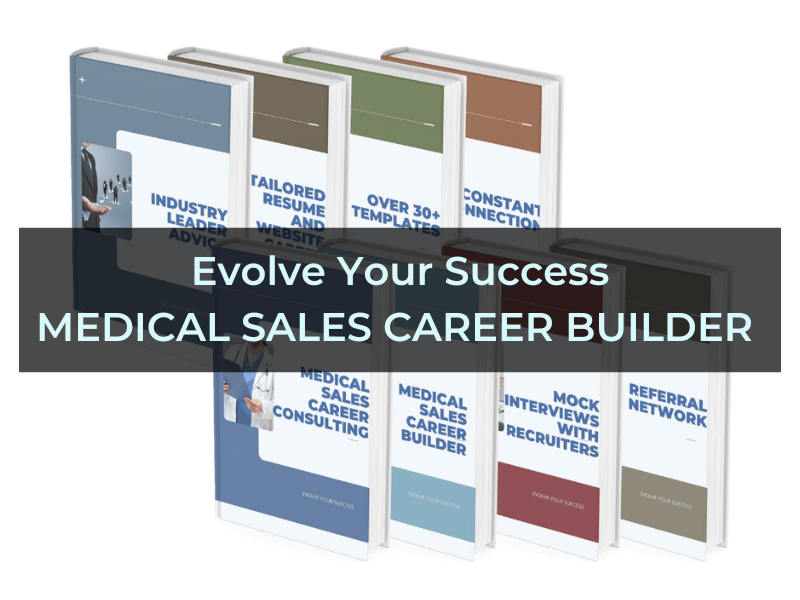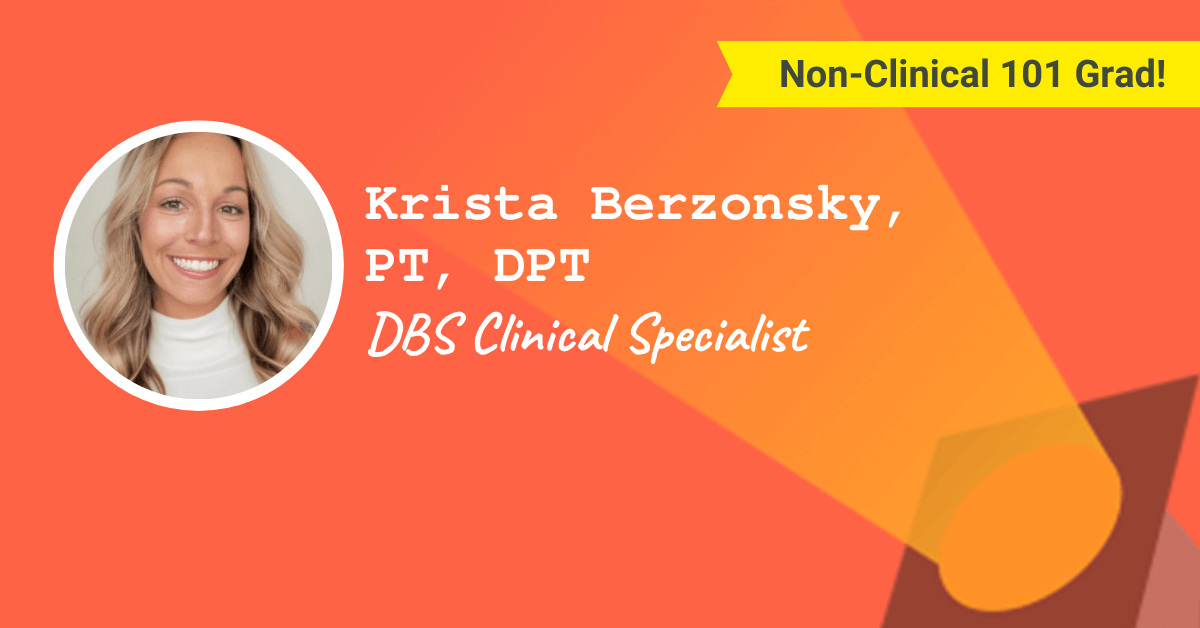This week’s spotlight is on Krista Berzonsky, PT, DPT, a Non-Clinical 101 graduate who is now DBS Clinical Specialist for Medtronic!
This post may contain affiliate links or codes. This won’t increase your cost, but it helps keep TNCPT alive, and free of annoying ads! Thank you for your support. 🙂
What is your full name, title, and company name for your current, primary role?
Krista Berzonsky, PT, DPT — DBS Clinical Specialist for Medtronic

Where are you located?
Sarasota, FL.
Where did you go to PT school, and what year did you graduate?
University of Pittsburgh, 2023.
Please refrain from contacting our spotlight participants on social media. There are thousands of readers just like you out there. 🙂 Please ask your questions in the comments on this blog post.
If you’re a Non-Clinical 101 student, you can network with many of our spotlight participants in the alumni groups!
What did you do when you first finished school, and for how long?
I worked at an inpatient rehab facility for one year following graduation.
In what setting(s) did you work, and what types of patients did you treat?
I worked in the inpatient rehab setting treating a variety of patients, including:
- Subacute/chronic stroke
- Spinal cord injury
- Amputees
- Parkinson’s disease (PD)
- ALS
- Post-op total joint replacements
- General reconditioning
What did you enjoy about your early roles? What didn’t you enjoy?
I enjoyed being able to spend time with each patient (about one and a half hours per treatment session) and getting to know them throughout their journey. I also enjoyed the multidisciplinary approach—working closely with OT, SLP, case management, and nursing.
I did not enjoy the amount of time spent on documentation, the excessive productivity demands and concurrent treatments, working on weekends/holidays, and the lack of growth and professional development opportunities.
When and why did you decide to do something non-clinical?
About six months after I started my first PT job, I knew I needed a change. I had always felt that I wasn’t going to be a PT for the rest of my life, even while in school. I was surprised that I was feeling this way so soon after graduation, but I was burned out.
I knew that switching settings wouldn’t solve the underlying issues I had with the field, so I joined The Non-Clinical PT’s Non-Clinical 101 course to explore other options.
What are you doing these days?
I’m currently working as a clinical specialist for Medtronic in their Deep Brain Stimulation (DBS) division. DBS is a therapy where patients with Parkinson’s disease are implanted with electrodes in the brain, and a battery implanted in the chest sends electrical impulses to nuclei in the basal ganglia to control motor symptoms.
Every day is so different—whether I’m in the operating room covering cases or in the clinic working closely with neurologists to program patients who have already been implanted to optimize their therapy for best symptom control.
I also attend local Parkinson’s support groups and patient events in the community to spread awareness about the therapy.
Are you still treating patients, or are you solely non-clinical?
I stayed on as a PRN PT for the same rehab company I was working for prior.
What percentage of your time is spent clinically vs. non-clinically?
I work one to two days per month on the weekends.
How long have you been in your current DBS clinical specialist role?
I began this role in June 2024.
Did you get any special certifications or training along the way to help you get into your current role?
I started with the Non-Clinical 101 course, which then led me to take the Medical Sales Career Builder course through Evolve Your Success (EYS).
It was a tough process trying to figure out my next step, but the Non-Clinical 101 course allowed me to reflect on my interests and skills and opened the door to medical device sales.
Had I not taken the EYS course, I would not have landed this role as soon as I had! This is my dream job, and I am so grateful for the resources that are out there to help clinicians like myself make the transition.
Sales can feel intimidating! But confidence comes from talking the talk and knowing you’re prepared to walk the walk. It’s much easier to sell yourself in interviews when you’ve gone through formal sales training. We highly recommend upskilling and working with the sales mentors at Evolve Your Success.
Their Medical Sales Career Builder program has a 100% satisfaction rating and 90% placement record! Mention that The Non-Clinical PT sent you to get $800 off!

How did you find your job? Did you apply or find it through a connection?
I found the opening on LinkedIn and spent countless hours networking, which ultimately led to referrals and an interview.
Did you do anything special to your resume and cover letter to land the job?
Evolve Your Success revamped my resume for me! I did not submit a cover letter.
What was the interview like for the DBS clinical specialist role?
The interview process was much different than a clinical interview. I had an in-person interview with my now district manager, followed by a panel interview with my manager and two other sales reps on my team. After that, I was asked to have two additional phone interviews—one with a different district manager and one with a rep in another territory.
How have people reacted to you leaving patient care?
Everyone has been extremely supportive of my transition, especially family and friends who are close to me.
Ultimately, they want me to be happy and have noticed a positive change in my mood and behavior since I started my new role!
What’s a typical day or week in the life like for you? What types of tasks and responsibilities fill your time?
My days and weeks vary, which I enjoy very much. I work closely with a sales rep in my territory, and we cover a large geography.
Mondays, Wednesdays, and Fridays are our main OR days with different neurosurgeons. On Thursdays, we cover a clinic for DBS patients needing initial programming, adjustments to their therapy, or general follow-ups to ensure their system is working well and checking for battery life to schedule replacements if needed. Some Saturdays, we will have patient events where we set up booths to educate new patients about how our therapy could benefit them and improve their quality of life.
What are some of the rewards of your role? What are the biggest challenges?
The most rewarding thing is seeing patients improve right in front of my eyes. Most patients are awake during the surgery when the leads are placed to ensure adequate lead placement and symptom control.
I’ll never forget my first case where a patient had a tremor, and it immediately vanished when the stimulation was turned on. The patients are so happy with outcomes and cannot thank you enough for giving them their life back; it’s truly an amazing therapy.
Some challenges have been time management, as it is not a typical 9-5 role. When I don’t have a scheduled case or clinic, I’m looking for productive ways to fill my time and provide value to my team. It can be stressful to ensure I am always prepared for every case and have extra product/backups if things don’t go as planned. I am looked at as the expert on my product in the OR and must act as such.
How did your clinical background prepare you for this role? Which skills transferred?
My knowledge and experience working with patients with Parkinson’s disease has been instrumental in my current role. I am very comfortable working with patients, HCPs, and other members of the care team.
I would say I still use quite a bit of my PT skills, oftentimes offering extra insight to the disease state or functional mobility for PD patients.
Roughly speaking, how are the hours and pay compared to patient care?
The hours vary; some days are longer than others. I do spend much of my time in the car traveling to/from different accounts in my area. Patients may call with questions about their therapy outside of normal business hours as well.
What type of person do you think would do well in your DBS clinical specialist role?
Someone who is outgoing, a patient advocate, and not afraid to ask questions or admit when they don’t know the answer. Also, someone who is committed to lifelong learning, as there is always new research and technology coming out to advance this therapy!
Do you work remotely or onsite?
I work mostly onsite at hospitals or in a clinic, but some days I will work remotely if there are no cases scheduled.
Does your organization hire PT, OT, or SLP professionals into non-clinical roles? If so, what type of roles?
Yes! I have met other clinicians in field roles similar to mine, as well as in Patient and Technical Services, Medical Affairs, and others.
Did you read any books, take any courses, or do anything special overall to get you where you are today?
I took both the Non-Clinical 101 course and the Medical Sales Career Builder course through Evolve Your Success.
I also read Start with Why by Simon Sinek, which is a fantastic book!
What is a typical career path for someone in your DBS clinical specialist role?
Depending on what your end goal is, there are many different paths you can take. For me, I have an opportunity to become Senior Clinical Specialist and beyond that, Principal CS. There is also an opportunity for me to transition to a sales rep position in a few years.
What is next for you? What are your high-level career aspirations?
In a few years, I see myself moving into a sales rep role with Medtronic DBS.
What would you recommend to someone who is considering going into a role like yours? Do you have any special words of wisdom for the readers?
Network, network, network!! I’ve found that most people are very open to having a conversation about their current role, particularly those with a therapy background. I found this to be the most beneficial, as it gives you insight into what it’s really like to work in a specific role and or company.
I’ve met some great people and mentors through networking, and that is how I landed my current role.
What career advice would you give yourself that you wish you had during school?
It’s okay to want something different. PT is not for everyone, and I oftentimes would compare myself to my counterparts who were excelling or very excited about the field.
The most important thing is that you’re passionate about what you’re doing. If you are, it won’t feel like work. The best advice I can give is that if it’s Sunday night and you’re dreading going to work on Monday, you need a change.
Do you have any special advice for others who want to follow in your footsteps as a DBS clinical specialist?
I’m always open to talking with other clinicians who want a change! Many people did this for me, and I want to pay it forward 🙂





